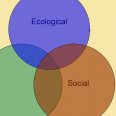Socio-Ecological Systems
SES Synergy: Finding and applying best practices in socio-ecological systems modeling and outreach
Institution: University of Maine
Sponsor: National Science Foundation through the Sustainability Solutions Initiative
The Sustainability Solutions Initiative (SSI) studies coupled socio-ecological systems (SES) to advance knowledge about sustainability and action toward it. However, because teams and study systems vary across the SSI portfolio, SES modeling approaches also vary significantly. This methodological diversity provides a rare opportunity to gather lessons on how to best employ SES models within a solutions-driven sustainability science program. We propose an integrative project that will explore and synthesize SES modeling across the SSI, produce comprehensive SES modeling and outreach recommendations, and act on those recommendations to achieve hard-won theoretical and practical integration across the SSI portfolio. The first phase of research will survey the use of SES modeling across SSI teams. Data collected will be compiled into a synthetic report which will include a typology of SES modeling approaches within and beyond the SSI, identify complementarities and gaps in the SES model portfolio, extract SES modeling best practices, and conclude with recommendations for future SES modeling outreach. A second phase will implement recommendations of the SES synthesis report, which might include an SES model for testing newly identified questions of sustainability science, a cross-project SES decision support model, or an participatory SES modeling workshop for improving collaboration and stakeholder engagement.
Team Members:
- Tim Waring, School of Economics (team leader)
- Brian McGill, School of Biology & Ecology & SSI
- David Hiebeler, Department of Mathematics and Statistics
- Laura Lindenfeld, Department of Communication & Journalism
Supported by National Science Foundation award EPS-0904155 to Maine EPSCoR at the University of Maine.

